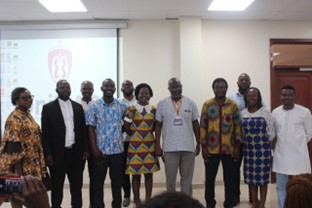Senior Lecturer and Dean-School of Alternative Learning (SAL) at the University of Media, Arts and Communication – Institute of Journalism (UniMAC-IJ), Dr. Stanley Semarco, has called for media owners, reporters and student journalists to focus on educational issues, problems and developments in their reporting.
This call is based on his research findings, revealing that many media houses in Ghana allocate limited time and space to stories concerning education.
Dr. Semarco made this revelation during his presentation at the 10th Inter-Faculty Research Seminar organised by the Directorate of Research, Innovations and Development (DRID) at the UniMAC-IJ.
He highlighted that only a few stories are captured in some print-media houses, as reported by Guana and Ibn in 2022. Of the four newspapers sampled in Ghana and Nigeria, including the Ghanaian Times and Daily Guide, only six hundred and thirty-seven (637) educational stories were covered in a year. The Ghanaian Times and Daily Guide covered 258 educational stories, indicating a lower rate of educational news reportage in the media.
The study also revealed that in other jurisdictions some broadcast news media houses reported under one percent of educational stories.
After the seminar, Journalism and Media Studies students expressed their interest in the study, finding it insightful and revealing. They indicated a desire to take keen interest in education sector issues and learn how best to communicate same for the needed impact.
They believe this will not only help promote transparency and enhance quality education, but also enhance their skills in covering and writing educational news stories.
Gabriel Jackson Oklu, a student journalist, commented “…henceforth, I will be writing and trying to find stories around education that I can work on to not only improve the school but also enhance my knowledge”.
Edna Garimah, another journalism student, remarked: “If you are educated, it gives you an upper hand in society; and so, if journalists are trained in reporting educational stories, it is going to help. If not anything else, I might consider majoring in education communication”.
Some lecturers who attended the seminar advised Dr. Semarco to ensure the final research work reaches stakeholders in education. They emphasised that the findings will be useful for media training institutions in the country.
In his closing remarks, Dr. James Asante, Dean-Journalism and Media Studies Faculty at UniMAC-IJ, expressed gratitude to Dr. Stanley Semarco for his insightful presentation.
Dr. Asante encouraged participants to carry forward the discussions and apply knowledge gained for contributing to advancements in education communication. He reiterated UniMAC-IJ’s commitment to fostering a culture of research and innovation to shape policies in the country.










